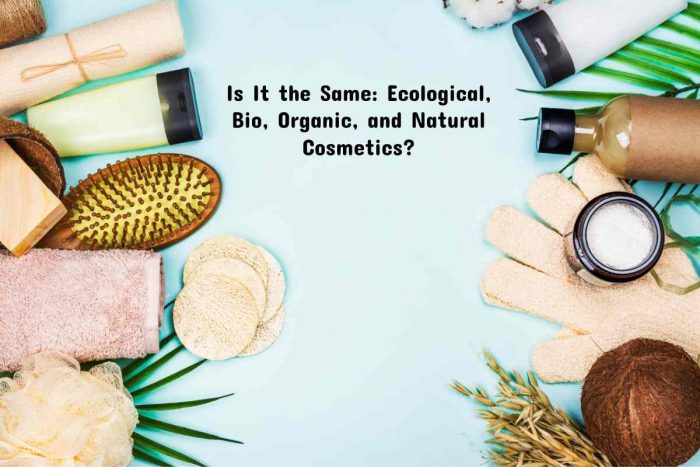Is It the Same: Ecological, Bio, Organic, and Natural Cosmetics? Ecological cosmetics offers products that take care of the skin and the environment. But, when choosing them, you can feel a bit overwhelmed with the terminology of the labels.
You will find the words bio, organic and natural in almost all of them. Commonly, these names stand thought to have the same meaning. However, it is not so. In this case, I will tell you about the differences between sustainable cosmetic products so that you can easily choose your skincare routine.
Table of Contents
Organic Cosmetics: What Are Natural Products?
Natural products are those composed of active ingredients of plant, mineral, or animal origin. Here are some examples:
Plant-based components:
- Almonds oil
- shea butter
- Water of roses
- Soy protein
Components of mineral origin:
- zinc oxide
- Clay
- Silica
- Titanium dioxide
Components of animal origin:
- Bee wax
- goat milk
- marine collagen
- Urea

Natural products made exclusively with plant-based ingredients stay classified as vegan. In addition, a cosmetic can stay considered born if it developed from biological raw materials treated with procedures free of toxins and contaminants.
Now comes the complicated part: the terms natural and organic remain not legally protected. Therefore, on many occasions, brands deceive the consumer, offering them a
Difference Between Ecological, Bio, Organic, And Natural Cosmetics
How are the ecological, bio, and organic seals different? How to know which one is better? These three terms stand found in hygiene and personal care products. But, unfortunately, the similarity between them tends to confuse us when buying.
The word organic is derivative from the English organic; when translated, it means a component of living beings. The term “bio” is an abbreviation of Biclique, the word used in France to distinguish organic substances. In Spain and Latin America, the expression “ecological” designates everything that comes from nature.
Unfortunately, no official law identifies when a product is genuinely ecological, bio, natural or organic. No regulations indicate labeling requirements, permitted and prohibited substances, or the appropriate proportion of natural ingredients.
However, there is an organic production policy of the European Union that establishes fundamental principles for the production of organic cosmetics:
It does not support the application of ionizing radiation.
Its prohibits using ionizing radiation, artificial fertilizers, herbicides, and pesticides.
It does not allow administering hormones and antibiotics to animals unless they are required to maintain their health.
Natural” product only contains 1% of vegetable or animal components.
Organic Cosmetics
The ingredients used in organic cosmetics, besides being of natural origin, must be free of synthetic chemicals, artificial preservatives, and other substances from the petrochemical industry.
They stand also manufactured and distributed under sustainable methods that optimize energy. They are not tested on animals and have a minimal environmental impact.
For their part, organic and vegan products only use animal products (honey, propolis, beeswax, etc.) They do not include the physical parts of animals and remain not tested on them.
Are All-Natural Products Organic?
The answer is no. A beauty or personal care item can include bioactive ingredients, but it must comply with the regulations that establish organic farming.
A single product may complete up to 5% of active ingredients from organic farming, combined with other natural elements processed with chemical treatments. In this case, it would not remain valued as an ecological product.
Bio or eco-certification seals remain on items containing at least 95% organic ingredients.
Natural cosmetology with ecological certification
Currently, certifying bodies are responsible for verifying whether a product is organic. Generally, they place a seal or logo to facilitate their identification by the consumer. You can even see several of these stamps in the same product.
The central organic certification bodies in Europe are:
UK: Soil Association.
France: Ecocar and Cosmetic
Germany: BDIH
Italy: AIAB y CCPB
How to Choose A Natural and Ecological Product?
To correctly choose an organic product, it is necessary to know its ingredients. Therefore, you should review the INCI, a list of mandatory ingredients under European cosmetic production regulations.
In this list, the ingredients appear according to their proportion within the formula. The former stays in greater quantity, and the latter has a less active presence.
Also, examine the Bio or Eco seal on the packaging. In Spain, the most common are those of Ecocar and Cosmetic.
Ecological Perfumes
Natural cosmetics have broadened their horizons. Now perfumes are more respectful of the skin and the environment.
Recognized firms such as Under green Paris, Rich Hippie, and Pacifica bet on vegetable oils and aromas from fruits to create perfumes with an ecological seal. In addition, they have innovative eco-friendly packaging that tin is recycled.
As you will see, in hygiene and personal care products, not everything natural is organic. Now that you know these differences, you can easily choose from the variety of organic cosmetic products we can find on the market.

